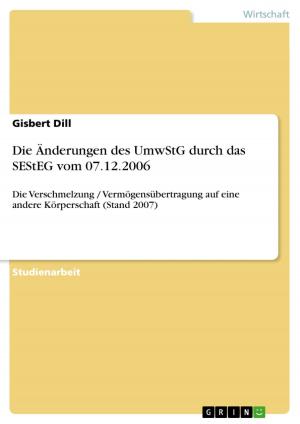Equity Prices. The Missing Link between Income Inequality and Financial Crises?
An empirical investigation
Business & Finance| Author: | Matthias Runkel | ISBN: | 9783656851882 |
| Publisher: | GRIN Verlag | Publication: | December 2, 2014 |
| Imprint: | GRIN Verlag | Language: | English |
| Author: | Matthias Runkel |
| ISBN: | 9783656851882 |
| Publisher: | GRIN Verlag |
| Publication: | December 2, 2014 |
| Imprint: | GRIN Verlag |
| Language: | English |
Master's Thesis from the year 2013 in the subject Economics - Other, grade: 8,5 (out of 10), Maastricht University, language: English, abstract: The question that has motivated this paper is whether financial crises and income inequality are systematically related. The long rise of inequality in many advanced countries prior to the Great Recession has inspired several authors (e.g. Fitoussi & Saraceno, 2010; Rajan, 2011; Stiglitz, 2009; Stockhammer, 2012) to argue that inequality is a root cause of this crisis. The suppressing effect of inequality on aggregate demand, these authors argue, has prompted many governments to adopt a debt-led growth model, which relies on over-borrowed, over-consuming households. Additionally, households on their own might respond to growing inequality by saving less, or borrowing more, in order to maintain a standard of living that they deem acceptable (Frank, Levine & Dijk, 2010; Kumhof & Rancière, 2010). This view thus sees inequality as a causal factor for rising debt and credit levels. But while debt and credit are the best predictors of financial crises (Jordà, Schularick & Taylor, 2011) the effect of income inequality on debt seems to be too weak to be considered a root cause (see, e.g. Bordo & Meissner, 2012). The co-occurrence of financial crises and periods of rising inequality may thus be caused by a third factor. This study introduces equity prices as a possible explanation. Firstly, equity prices affect several sources of income with little delay: equity investments often pay dividends; they can potentially be resold at a capital gain; and the performance of company stocks might determine the compensation of top executives in financial and non-financial industries. Secondly, asset prices in general are an indicator of financial stability due to their systematic and interdependent relation to credit (Mendoza and Terrones, 2008), and they reveal a systematic boom-bust pattern around banking crises (Reinhart & Rogoff, 2009). The goal of this study is hence to examine these two properties of equity prices in more detail and connect them in order to establish a theoretical framework that explains why financial crises are often associated with a preceding rise in income inequality. Beyond this, the link between equity prices and top income shares will be empirically tested utilizing a panel of 18 advanced economies between 1913 and 2011. The significant results are then used to analyze the implications for inequality of income in times of crises.
Master's Thesis from the year 2013 in the subject Economics - Other, grade: 8,5 (out of 10), Maastricht University, language: English, abstract: The question that has motivated this paper is whether financial crises and income inequality are systematically related. The long rise of inequality in many advanced countries prior to the Great Recession has inspired several authors (e.g. Fitoussi & Saraceno, 2010; Rajan, 2011; Stiglitz, 2009; Stockhammer, 2012) to argue that inequality is a root cause of this crisis. The suppressing effect of inequality on aggregate demand, these authors argue, has prompted many governments to adopt a debt-led growth model, which relies on over-borrowed, over-consuming households. Additionally, households on their own might respond to growing inequality by saving less, or borrowing more, in order to maintain a standard of living that they deem acceptable (Frank, Levine & Dijk, 2010; Kumhof & Rancière, 2010). This view thus sees inequality as a causal factor for rising debt and credit levels. But while debt and credit are the best predictors of financial crises (Jordà, Schularick & Taylor, 2011) the effect of income inequality on debt seems to be too weak to be considered a root cause (see, e.g. Bordo & Meissner, 2012). The co-occurrence of financial crises and periods of rising inequality may thus be caused by a third factor. This study introduces equity prices as a possible explanation. Firstly, equity prices affect several sources of income with little delay: equity investments often pay dividends; they can potentially be resold at a capital gain; and the performance of company stocks might determine the compensation of top executives in financial and non-financial industries. Secondly, asset prices in general are an indicator of financial stability due to their systematic and interdependent relation to credit (Mendoza and Terrones, 2008), and they reveal a systematic boom-bust pattern around banking crises (Reinhart & Rogoff, 2009). The goal of this study is hence to examine these two properties of equity prices in more detail and connect them in order to establish a theoretical framework that explains why financial crises are often associated with a preceding rise in income inequality. Beyond this, the link between equity prices and top income shares will be empirically tested utilizing a panel of 18 advanced economies between 1913 and 2011. The significant results are then used to analyze the implications for inequality of income in times of crises.















